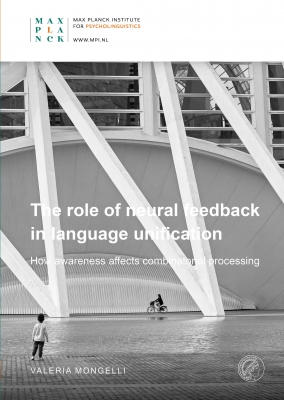Valeria Mongelli will defend her thesis Monday 20th of January 2020

While most living creatures have a code of communication, human communication faculty, which we call language, is the only faculty that is virtually infinite in its capacity of expression. How the human brain combines a finite number of words into possibly unlimited sentences is a crucial, still unanswered issue in cognitive neuroscience. Within language processing, one distinguishes between single word and sentence processing. In her thesis, Valeria Mongelli investigated which brain mechanisms allow us to disentangle sentence and single word processing. She tested the prediction that sentence processing requires long-distance feedback (top-down) processing, likely involving frontal and temporal areas. On the contrary, single word processing may only rely on feedforward processing. She employed visual masking to investigate this issue. Visual masking is an experimental technique that makes visually presented words “invisible” by briefly flashing them on the computer screen, hidden among other visual stimuli. Previous research on visual perception has shown that masking disrupts feedback processing, while preserving feedforward (bottom-up) processing. In four electroencephalography experiments, she employed masking to disrupt feedback and investigated which processes were impaired under these conditions. Overall, she found that masking disrupts sentence processing, but not single word processing. Therefore, sentence processing requires full awareness, whereas single word processing may occur under reduced levels of awareness. These results suggest that feedback processing is required for sentence processing, but not for single word processing, adding new insights to the specific roles of different brain mechanisms in a distributed language network.
Share this page